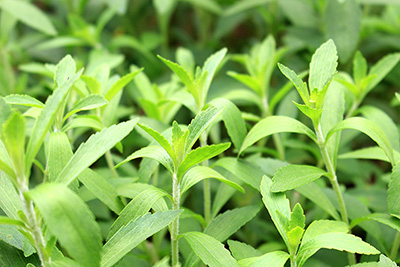What is Stevia?
Mon, Apr 4th, 2022
Stevia is a sweetener that is made from the Rebaudiana Bertoni plant which primarily grows in Paraguay and Brazil. The plant has been used for many years by other cultures as a natural sweetener but the use of stevia as a sugar substitute is becoming more popular in North America. The leaves of the stevia plant contain compounds that provide sweetness and are about 150-300 times sweeter than sugar.
How is Stevia Processed?
The leaves of the stevia plant are dried and then ground into a powder. The powder is then blended with other ingredients to make it into a liquid, tablet, or powder form.
Stevia is sold as drops, packets, or white powder. It can also be found in some foods and beverages.
There are different ways people use stevia including:
- To sweeten their beverages
- In food recipes
- As a sugar substitute
- In baking
- Sprinkled on cereal
Stevia can't be used in equal ratios to sugar and each brand has its own sugar to stevia ratio so make sure to check how much is recommended to use. Stevia is so much sweeter than sugar you probably won't need as much. There are also different flavors of stevia such as vanilla, berry, and chocolate. You can find stevia in most major grocery stores.
Is Stevia Safe?
Yes, stevia is "generally recognized as safe" by the Food and Drug Administration (FDA). It has been used for many years and is a natural sweetener. Stevia does not affect blood sugar levels like other artificial sweeteners such as aspartame or sucralose.
What are the benefits of Stevia?
Some people choose to use stevia as a sugar substitute because it has some health benefits. Some benefits include:
- It has no calories or carbs
- It helps control blood sugar levels
- It's safe for people with diabetes
- It doesn't raise blood pressure
Is Stevia Good for Your Teeth?
According to a study done by The Caries Research Journal, stevia does not contain fermentable carbohydrates and does not cause cavities. Cavities are caused by the bacteria in your mouth that feast on sugar and produce acids that wear away at your teeth. So, stevia is a good sugar substitute for people who are trying to prevent cavities. However, stevia is still a sweetener so you should not overuse it. Just like with anything else, moderation is key!
Is Stevia Bad for Your Teeth?
Although stevia is not as harmful to your teeth as regular sugar, it is still a good idea to brush your teeth regularly and see your dentist for checkups. Using stevia as a sugar substitute in place of regular sugar can help reduce the amount of sugar you consume which may help keep your teeth healthier.
Conclusion
The bottom line is that anything you can do to cut down on consuming sugar can greatly impact your teeth in a more positive way. Also, brushing twice a day, flossing, scheduling regular cleanings, and making an appointment to see your dentist at the first sign of any dental issues will all help to reduce your risk of future teeth and gum issues.
Contact Arnold Dentistry to make an appointment to help keep your smile bright and beautiful! (813) 689-1529
Source: Web MD, National Library of Medicine






